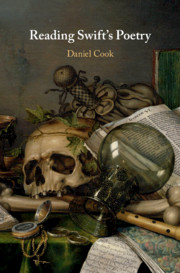Introduction
Published online by Cambridge University Press: 10 August 2020
Summary
Denham praises Cowley for writing original verse under the appropriate influence of prominent models old and new. In Swift’s poem, more than half a century later, the venerable art of imitation (imitatio veterum) had been displaced by the dubious threat of theft (stealing hints). What does it mean to steal a hint? ‘To steal another’s idea is wrong’, as James McLaverty says; but ‘to take it and adapt it (as Swift does with the La Rochefoucauld maxim that stimulates the Verses or with Denham’s couplet in these lines) is a vital aspect of invention’.2 A hint can be gifted and regifted among likeminded writers. Swift gave John Gay the idea for The Beggar’s Opera, though the latter preferred ‘to have my own Scheme and to treat it in my own way’.3 Sometimes ‘a friend’, Swift retorted, ‘may give you a lucky [hint] just suited to your own imagination’.4 But hints can be hijacked by hacks, as Pope affirms in the first book of the 1728 Dunciad: ‘How hints, like spawn, scarce quick in embryo lie; / How new-born nonsense first is taught to cry’.5
- Type
- Chapter
- Information
- Reading Swift's Poetry , pp. 1 - 8Publisher: Cambridge University PressPrint publication year: 2020

